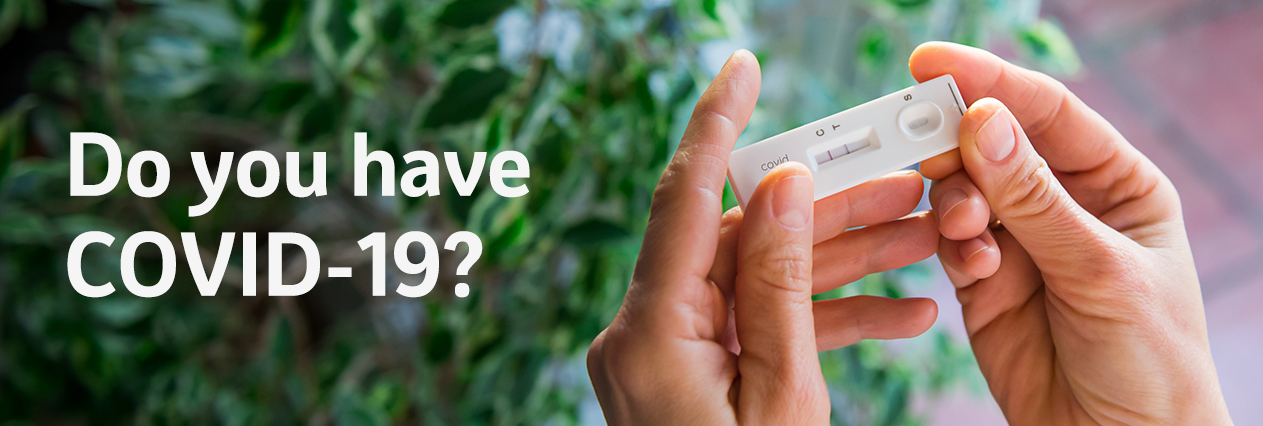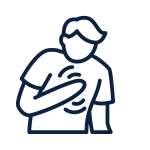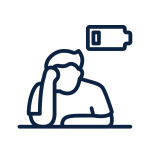
It is not always easy to tell the difference between the symptoms of COVID-19 and symptoms of other illnesses, such as influenza or the common cold.3
Symptoms of COVID-19 can range from mild to severe. Some people recover easliy, and others get very sick very quickly. If you test positive for COVID-19 you may experience:3
Symptoms of COVID-19:

Fever or chills

Cough

Shortness of breath or
difficulty breathing

Sore throat
Other symptoms include:

Muscle or body aches

Headache

Temporary loss of smell or altered loss of taste.

Fatigue

Congestion or runny nose

Nausea or loss of appetite

Diarrhoea or vomiting
Should I take a COVID-19 test?
If you are experiencing any of these symptoms, take a COVID-19 test. Even if you are not experiencing symptoms, but you have been exposed to someone who has tested positive for COVID-19, or you are worried that you may have COVID-19, take a COVID-19 test regularly for at least 7 days, especially if your are at risk of severe illness.5
If you test positive for COVID-19 and are at risk of severe illness from COVID-19, contact your doctor immediately. Antiviral medicines are available for those at risk of developing severe disease but must be taken without delay. Talk to your doctor for advice.
It is important for you to discuss your options with your doctor. You may find this guide to contacting your GP helpful.
What COVID-19 test should you have?
There are two types of tests that can detect the presence of COVID-19; Rapid Antigen Tests (RATs) and nucleic acid tests like Polymerase Chain Reaction (PCR) tests.
It is recommended that you take a PCR test, as they are generally better at detecting COVID-19 than RATs.2
It is possible to be infected with COVID-19 but receive a negative RAT result. It is recommended that you stay at home until your results are confirmed by a PCR test.5
Contact your doctor for further advice.
If you have symptoms, you can call the National Coronavirus Hotline 24 hours a day, 7 days a week on 1800 020 080.
What to do if you test positive
If you test positive for COVID-19 and are at risk of severe illness from COVID-19, contact your doctor immediately. Antiviral medicines are available for those at risk of developing severe disease but must be taken without delay. Talk to your doctor for advice.
If you test positive and have symptoms, it is recommended you stay at home until your symptoms resolve.6
Test at the first sign of COVID-19 symptoms. If you test positive and are at high risk of
severe COVID-19, talk to your doctor for advice without delay.
#PlanForCovid
Tell your family and friends about planning for COVID-19.
By clicking any of the links listed below, you will be leaving the MSD website. The link you have selected will take you to a third-party website. We do not review or control the content of any third-party site. We do not endorse and are not responsible for the accuracy, content, practices, or standards of any third-party sources.
References
- Updated eligibility for oral COVID-19 treatments. Australian Government Department of Health and Aged Care. Accessed 15 August 2023.
https://www.health.gov.au/health-alerts/covid-19/treatments/eligibility - How testing works for COVID-19. Therapeutic Goods Administration. Accessed 16 March 2023. https://www.tga.gov.au/products/covid-19/covid-19-tests/how-testing-works-covid-19
- COVID-19 disease and symptoms. Australian Government Department of Health and Aged Care. Accessed 24 February 2023. https://www.health.gov.au/health-alerts/covid-19/symptoms
- Risk factors for more serious illness. Australian Government Department of Health and Aged Care. Accessed 24 February 2023.
https://www.health.gov.au/health-alerts/covid-19/advice-for-groups-at-risk/risk-factors-for-more-serious-illness - What COVID-19 test should I do? NSW Government. Accessed 15 March 2023.
https://www.nsw.gov.au/covid-19/testing-managing/get-tested-for-covid-19 - Testing for COVID-19. Australian Government Department of Health and Aged Care. Accessed 24 February 2023. https://www.health.gov.au/health-alerts/covid-19/testing
- Medicines for treating COVID-19. Health Direct. Accessed 15 March 2023.
https://www.healthdirect.gov.au/covid-19/medications - Protect yourself and others from COVID-19. Australian Government Department of Health and Aged Care. Accessed 24 February 2023.
https://www.health.gov.au/health-alerts/covid-19/protect-yourself-and-others - If you have COVID-19. Australian Government Department of Health and Aged Care. Accessed 15 March 2023. https://www.health.gov.au/health-alerts/covid-19/testing-positive#testing-positive-for-covid19




